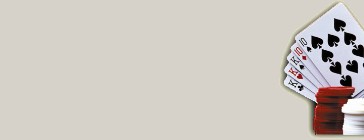|
POKER TIPS,
POKER STRATEGIES, POKER BONUS CODES, SITE REVIEWS,
HOLD EM HELP, DOWNLOADS, POKER CHEATS, POKER PRIZES,
TEXAS HOLD EM TIPS AND MORE
 |
 |
 |
 |
 |
 |
 |
 |
|
poker search
 |
PokerPlayday.com is designed to assist the online poker
community find the best bonuses, online sites, merchandise,
strategies, downloads and anything else related to poker
and Texas Hold 'em.
 |
|
|
 |
 |
 |
 |
|
|
 |
 |
 |
 |
 |
 |
 |
 |
 |
 |
 |
 |
 |
 |
 |
 |
 |
|
CALCULATING AND UNDERSTANDING TEXAS HOLDEM POT ODDS |
|
|
| |
| |
|
STARTING HAND STRENGTH |
The biggest mistake made
by most card players is
playing TOO MANY HANDS.
For example, tell me if
this thought has ever
crossed your mind...
"It's worth calling the
flop even though I have
bad cards-- because who
knows, I might catch
three-of-a-kind... or
two pair... or something
really good!"
Every poker player has
had this thought from
time to time. Even the
pros.
But the problem is,
thinking like this will
cause you to LOSE BIG
TIME in the long run.
And the reason is
because of the ODDS.
Even though you might
make a "great hand" once
in every twenty flops,
those other nineteen
hands will cause you to
lose MORE than you won.
For example, at a 10-man
table pocket Aces has a
hand rank of 100% and is
GROUP 1. Pocket two's
has a hand rank of
63.3%, which is in GROUP
7. (This is for hands to
the river.)
But let's be honest...
understanding how "good"
those hands are is EASY.
You don't need an odds
calculator for that.
But let me ask you,
which of THESE hands do
you think has the
highest "Hand Rank"?
a.) Queen-9 suited
b.) Ace-5 suited
c.) Jack-10 suited
d.) Ace-Queen offsuit
(Here's a hint... the
strongest hand is NOT
options "b" or "d"...)
Give up? Are you
surprised that A-Q
wasn't the strongest?
Know the exact hand
strength right away and
make a more educated
(translation = MORE
ADVANTAGEOUS IN THE END)
decision before the
flop. |
|
|
|
KNOW YOUR OUTS |
As you probably know,
"outs" are cards that
will help you improve
your existing hand.
For example, let's say
you're holding 5-6 and
the flop comes out
3-4-Q. That means you
need either a two or a
seven to make a
straight...
Since there are four
two's and four seven's
in the deck, you have
EIGHT OUTS.
For example, in the
scenario above with the
straight draw, let's say
you ALSO had a spade
flush draw. That means
you have more than eight
outs, since one more
spade will help you.
Now, if I have 8 outs,
here is the calculation
of hitting one of my
cards on the turn or
river:
There are 47 cards left
unseen (I'm holding 2,
there are 3 on the
board, 52-5= 47). 47 - 8
outs = 39.
My calculation becomes:
1 - 39/47 (turn) * 38/46
(46 cards unseen prior
to river):
1 - 39/47 * 38/46 =
31.5%
I have a 31.5% chance to
hit my hand over the
turn and river.
|
|
# OF OUTS
TURN+RIVER |
% |
# OF OUTS
RIVER |
% |
|
1
2
3
4 (Inside straight draw)
5
6 (Two overs)
7
8 (Open ended straight
draw)
9 (Flush draw)
10
11
12 (Flush draw + Gut
shot)
13
14
15 (Straight Flush draw)
16
17
18 |
4.4
8.4
12.5
16.5
20.3
24.1
27.8
31.5
35.0
38.4
41.7
45.0
48.1
51.2
54.1
57.0
59.8
62.4 |
1
2
3
4 (Inside straight draw)
5
6 (Two overs)
7
8 (Open ended straight
draw)
9 (Flush draw)
10
11
12 (Flush draw + Gut
shot)
13
14
15 (Straight Flush draw)
16
17
18 |
2.2
4.3
6.5
8.7
10.9
13.0
15.2
17.4
19.6
21.7
23.9
26.1
28.3
30.4
32.6
34.8
37.0
39.1 |
|
|
If you don't like
memorizing charts then
there are some shortcuts
that can be used. For
example, if you have 1
to 9 outs and the turn
and river cards are yet
to be seen then you can
multiply your outs times
4 to come within 1
percentage point of the
true chances of hitting
your card. This covers
the inside straight
draw(4 outs), 2 overs(6
outs), the open ended
straight draw(8 outs)
and the flush draw(9
outs).
For example, 2 overs is
6 outs multiplied by 4
is 24% which is your
approximate chance of
getting at least one of
your overs. Memorize
these figures
(particularly the first
chart), they will help
you justify your calls.
Now, the above scenarios
were pretty simplified.
There are other, more
advanced, factors to
potentially consider.
For example, if you do
not hit your card on the
turn, can you assume
Player1 will bet again
and how much? If you
know this information,
this should also be
included in your
calculation of the bet
vs. pot amounts.
Let's say you know
Player1 will probably
bet another $4 on the
turn. So really, you are
looking at calling $6.00
against a pot of $16.00.
The percentage now is
37.5% (6/16) as opposed
to our earlier example
where it was 17%. In
this case, the call
isn't as clear and the
current pot odds don't
quite justify the call
because 37.5% is greater
than our 31.5%. However,
there are implied odds
to consider, and these
odds may justify making
this call.
This the last factor
that is important to
consider - implied odds.
In the game of no-limit
holdem, you potentially
could win a much larger
pot than the current pot
you are calculating your
odds against. If you do
hit your hand, could you
then bet the entire pot
amount and assume
Player1 will call? How
much of a bankroll does
Player1 have and is it
possible to take it all
on this hand? These are
interesting questions
and also can affect your
decision. The total pot
size at the very end of
the hand, could easily
justify making the call
in the hopes of winning
that pot. This is called
"implied odds" and
should also be
considered. |
Pot odds
explained
A lot of the
money to be
made in
poker comes
from players
who chase
draws in
small pots.
Most of the
time, draws
do not come
through, so
the money
spent on
calls is
lost. When
a draw hits,
there must
be enough
money in the
pot to make
up for all
those times
it didn't.
Enter the
concept of
"pot odds."
The
money in the
pot must be
greater than
the odds of
completing a
draw.
|
# OF OUTS
POT ODDS
2
23:1
3
17:1
4
11:1
5
9:1
6
8:1
7
7:1
8
5:1
9
4:1
10
7:2
11
3:1
12
3:1
|
 
|
|
|
 |
|
|
|
|
|
|
Home
Poker Tips
Poker Reviews
Downloads
Bonus Codes
Poker Gifts
Poker
Merchandise Newsletter
Free Poker Drawing
Contact Us
Affiliates
Poker Links |
|
|
|
 |
 |
|
COPYRIGHT (C) 2006, PokerPlayday. ALL RIGHT RESERVED.
|
|
 |
 |
 |
 |
 |
 |
 |
 |
 |
|
 |
 |









